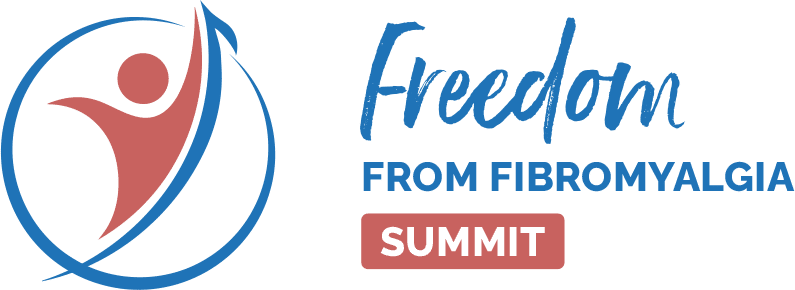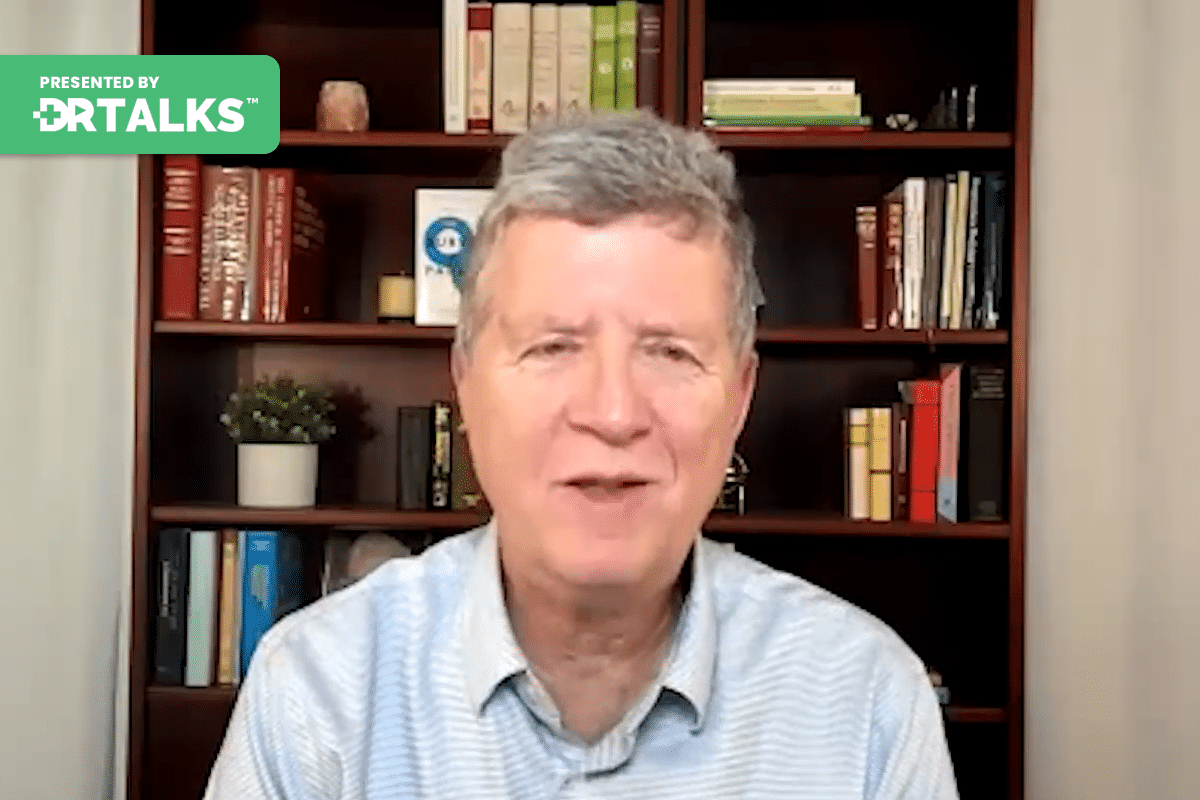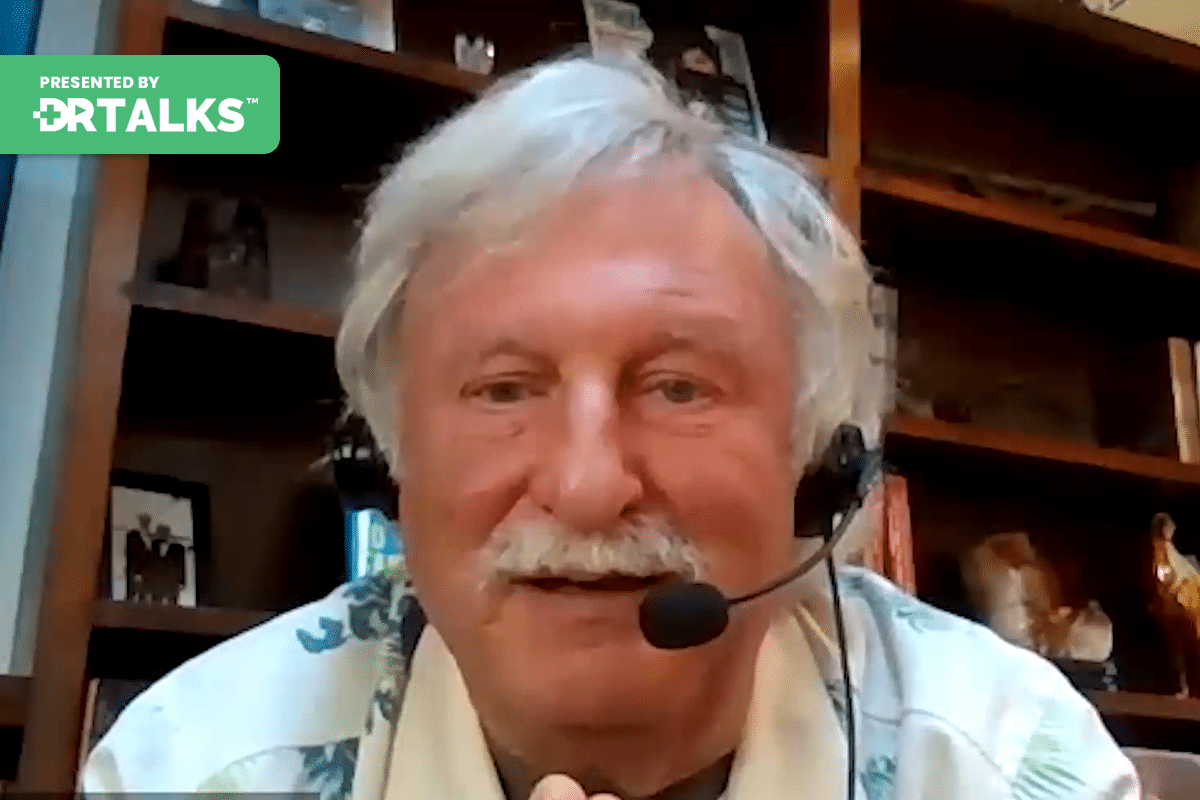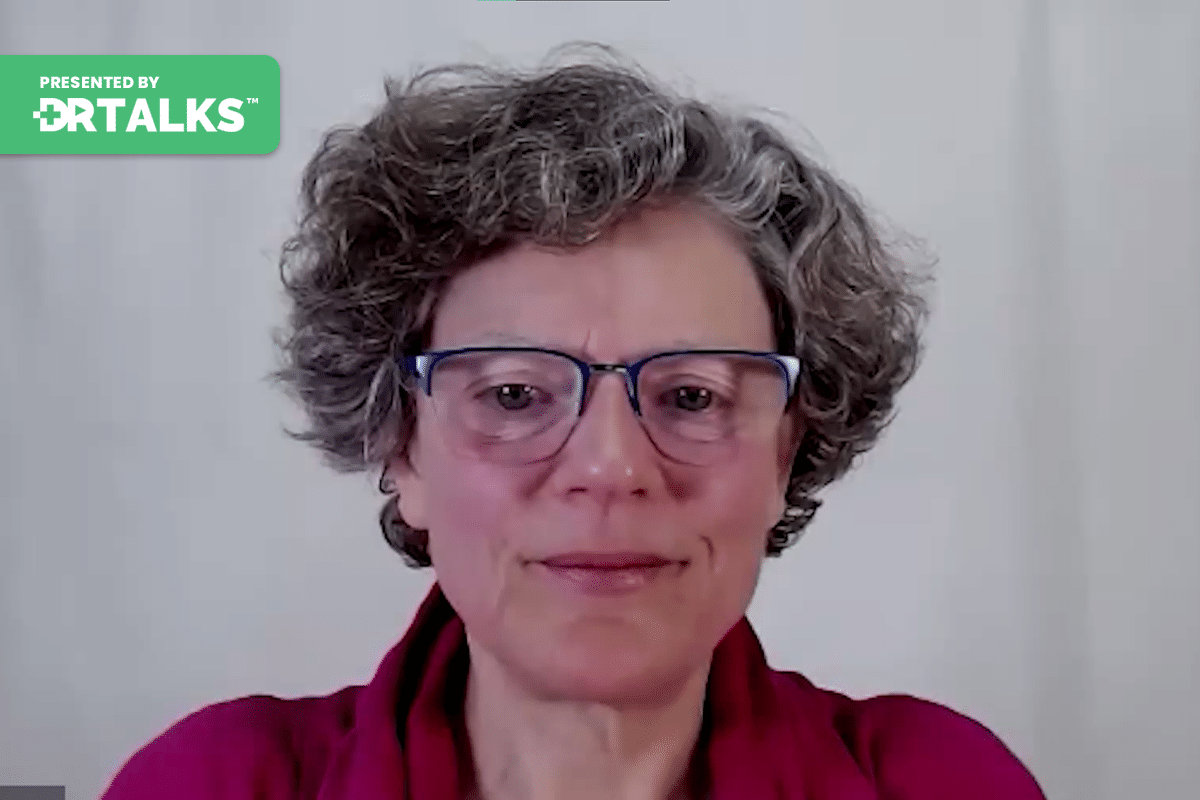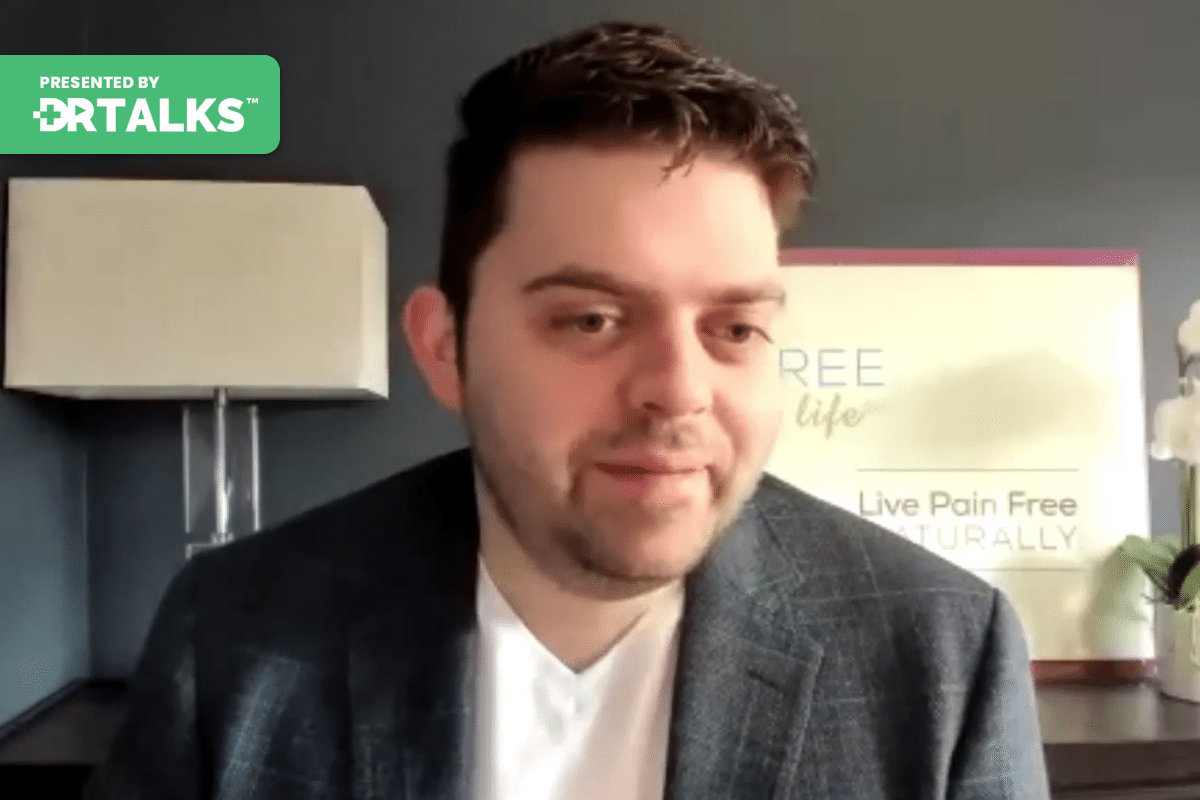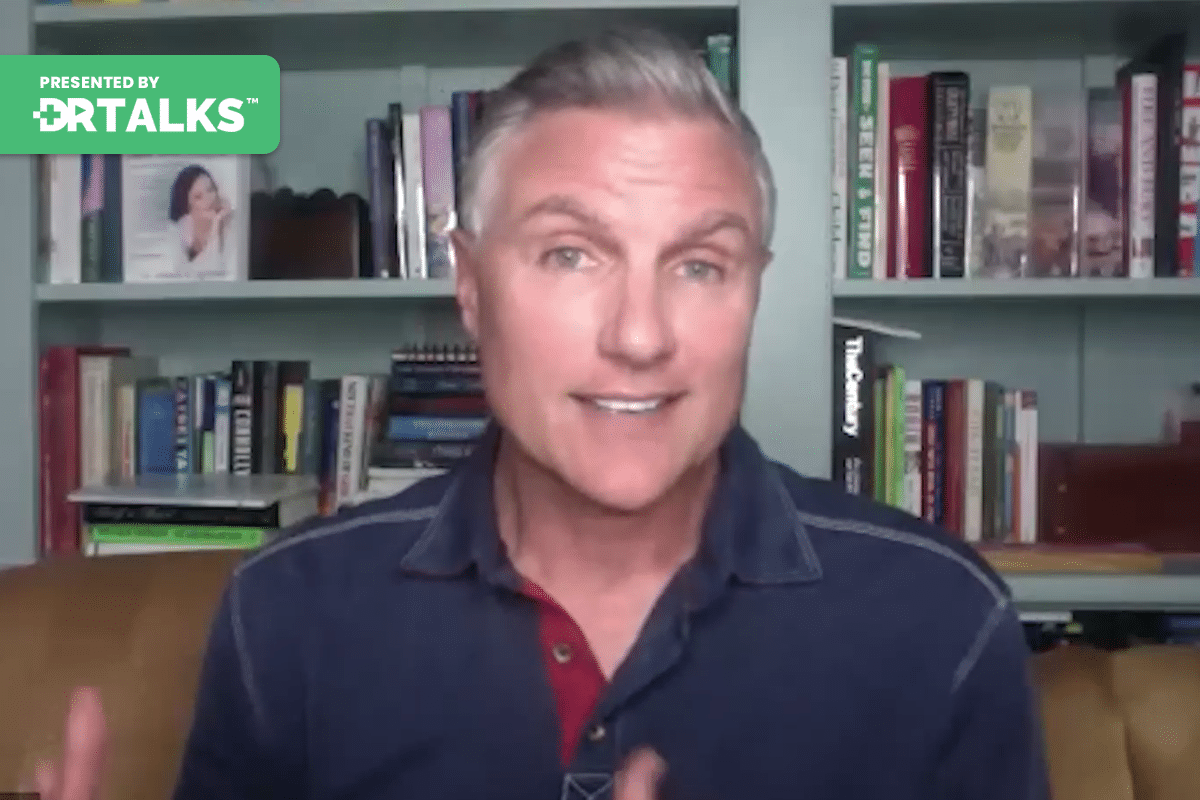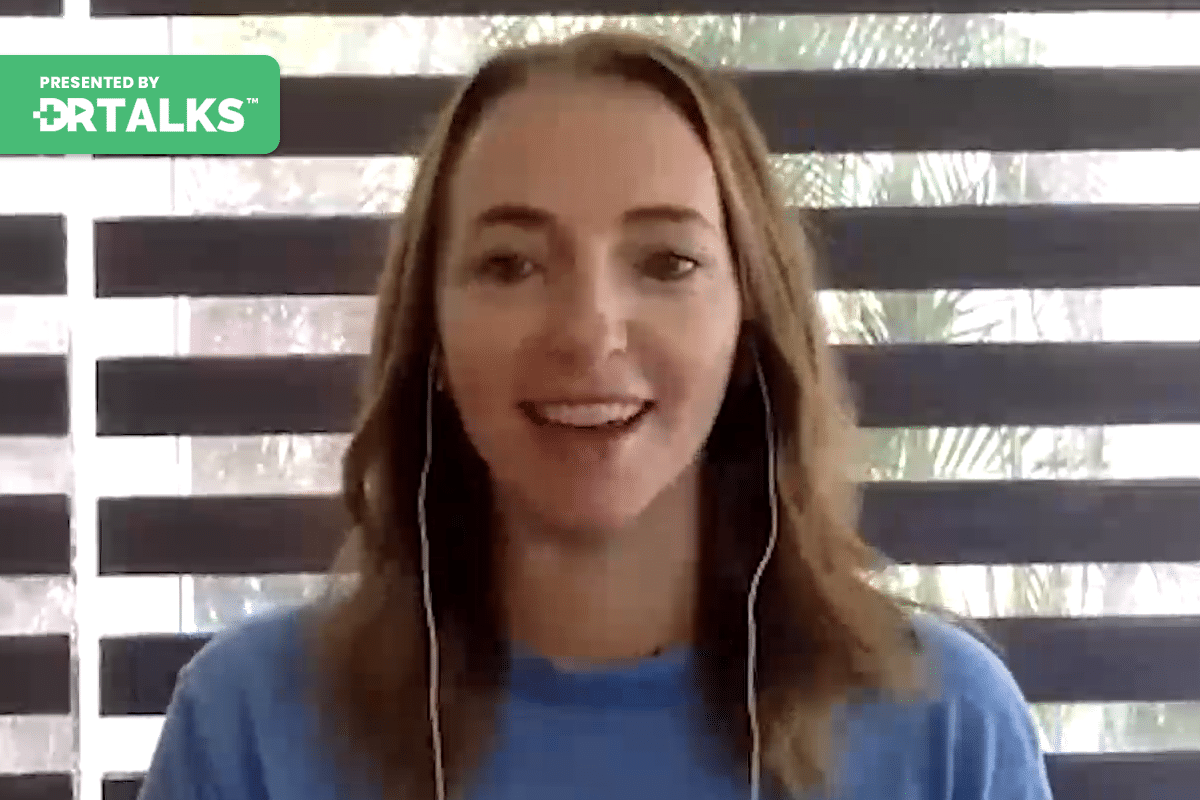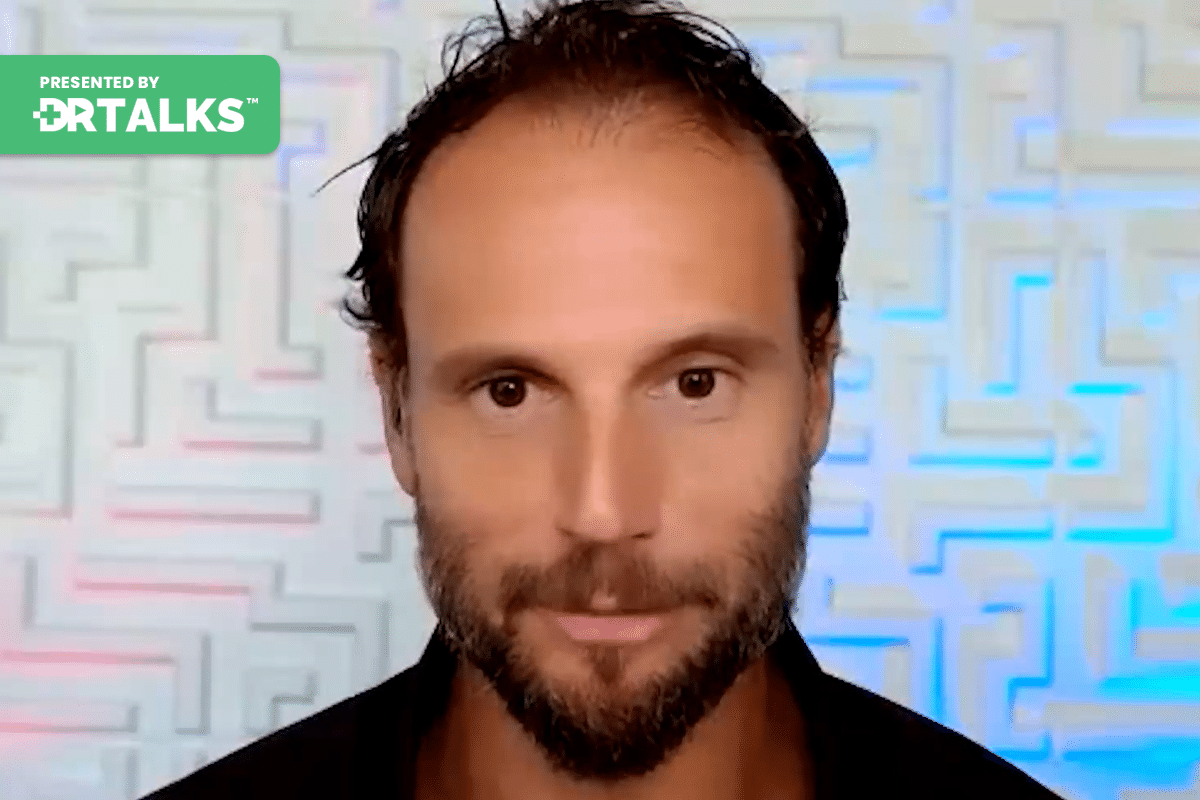Join the discussion below
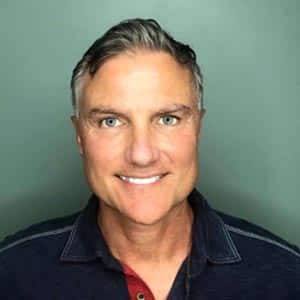
Dr. Rodger Murphree is a chiropractic physician and board certified nutritional specialist. He is an internationally recognized fibromyalgia expert. His “Murphree Method,” a combination of functional and orthomolecular medicine, has helped thousands of patients get healthy and feel good again. He’s the author of 3 books for patients and doctors including... Read More
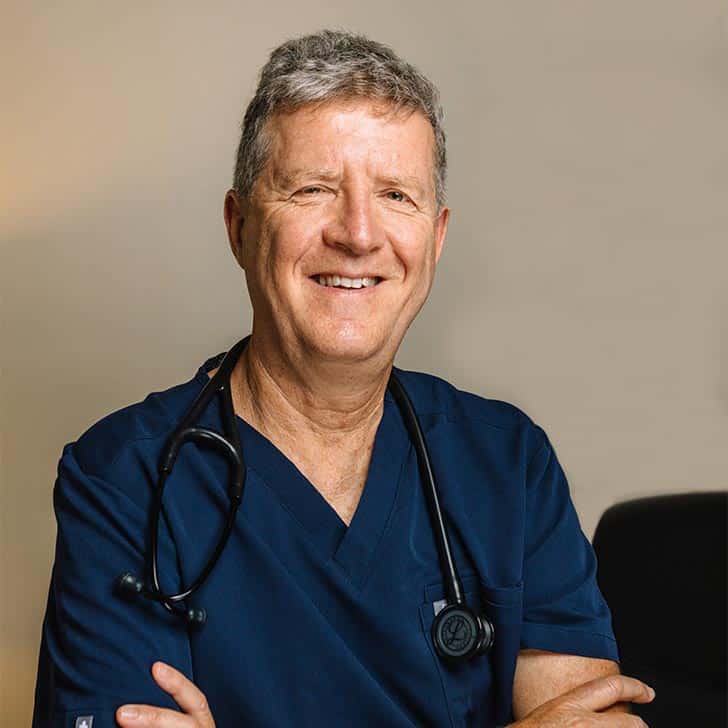
Isaac Eliaz, MD, MS, LAc has been a pioneer in the field of integrative medicine since the early 1980s, with a focus on cancer, immune health, detoxification and mind-body medicine. He is a respected formulator, clinician, researcher, author and educator, and a life-long student and practitioner of Buddhist meditation. With... Read More
- How stress and fear keep us sick and tired
- How stress real or imagined can cause mitochondria to turn off creating low energy, inflammation and pain
- What is galectin 3 and why is it the key for more energy and less pain?
Related Topics
Autoimmune Disease, Chronic Fatigue, Chronic Illness, Energy, Fibromyalgia, Galectin-3, Inflammation, Mitochondria, Pain, Stress, SyndromeRodger Murphree, DC, CNS
Hi. Welcome. I’m Dr. Rodger Murphree, and I’m the host of Freedom from Fibromyalgia Summit. I like to welcome Dr. Isaac Eliaz. So Dr. Eliaz is getting to be a not only a colleague, but a friend. We’ve appeared on some podcasts and some summits in the past here recently. In the past few months and really love his work on to read you a little bit about his bio, so don’t miss anything. But Dr. Eliaz is a leading expert in the field of integrative medicine, specializing in cancer detoxification, immunity and complex medical conditions. He’s a respected researcher, physician, researcher. He’s a bestselling author and educator and mind body practitioner. And a little bit about we’re going to talk a bit about his book.
I want to make sure I mention that we’re going to have to the survival paradox. I want to make sure we mention that. And he’s the coauthor of Studies on Integrative Therapies for Cancer Heavy Metal Toxicity and Others, and worked with the NIH, with partners in the National Institute of Health in Columbia and others. So there’s your bio goes on an hour, but that’s good enough. Welcome to the summit. I’m always excited to get a chance to to pick your brain about, you know, what’s going on in the research world and in particularly what’s going on, what you’re seeing with fibromyalgia, some of these underlying triggers that are creating these symptoms that we see with fibromyalgia. So welcome to the summit.
Isaac Eliaz, MD, MS, LAc
Thank you. Thank you for having me. It’s such an important topic and something I was interested in actually very early in my career, in my late twenties. And, you know, when this was starting to appear fibromyalgia, chronic fatigue and it was really not not appreciated recog analyzed and doubted, you know, by the doubters. So and now, of course, everybody understands the importance of this condition, how many people it affects. And so I’m delighted to actually speak in this summit.
Rodger Murphree, DC, CNS
Yeah. I’ve got a list of questions here that I have, you know, that I wrote down, make sure that we cover. But I’m also a little bit of a curve and ask you this. Why do you think we still have so many physicians that doubt the existence of fibromyalgia?
Isaac Eliaz, MD, MS, LAc
A It’s a good question. I think they are less it said, you know, medicine is driven by putting people in boxes and the fibromyalgia is not such an easy box to put in because some people is a virus something, but it talks in some people it’s trauma. Some people is inefficient energy pathways. And so whenever you have a condition that doesn’t not easy to put in a box. And actually that’s what life is about. You and I know then there is either a resistance or skepticism or fear of what we don’t know. And definitely the fiber of my LGA community is one of communities that really paid the price is you know so well, you do so much work in it really being underrecognized and not valued and labeled like all your psychological problems. It’s insane. It’s like it’s and really wonderful people often very sensitive, you know, very sweet, very sensitive, so sensitive to energy changes. And so it’s quite a journey. I think we are it’s a much better place where, you know, yeah, I can tell you talking, looking 40 years back, you would think twice even about mentioning the name or doing a summit about it, you know, so definitely in a different place. But there are good solutions.
Rodger Murphree, DC, CNS
So yeah. So you mentioned that fibromyalgia is an illness with different triggers. It’s someone one person is fibromyalgia is different. The next person I mean, there’s some common commonalities for sure, right. But unlike a lot of diseases, we have to realize that fibromyalgia, since it’s a syndrome, it’s really just a name given to describe these different symptoms that people have in common. But there are there’s no one smoking gun. I mean, it can be different things that bring this condition on, right?
Isaac Eliaz, MD, MS, LAc
Of course. Of course. And that’s why and it’s part of really understanding and treating fibromyalgia is understanding the person who has fibromyalgia. Yeah, in principle for me, I always treat the person ever to be the disease. You know, when I was working with one of my doctors and somebody called, they had a lung transplant and I think another transplant and some other disease. And in some and they asked me, can you see them? I said them, yes. The other doctor asked me, how can you see them? It’s so complex. Tell them I’m not treating the disease and treating the person once and just and the person I know how to treat them. And so fibromyalgia falls into this category. And within it. Yeah, it’s fascinating. I know I’m going to go like on a tangent, but the certain point that I discussed about fibromyalgia, you know, the ability of keeping sustainable energy on a long term, on a short term and the cost on the long term. You know, so we know it energetically in Chinese medicine, but now we know it much more in Western medicine with the whole issue of mitochondrial function and normal energy production and efficient energy production. Yeah. So yeah, it’s definitely to do that because it’s pain that causes limitation and one condition that really can transform remarkably. It’s really it’s one of these, one of these syndromes condition whatever you want to call it, it can really like can really change dramatically sometime very quickly.
Rodger Murphree, DC, CNS
So I want to ask you here in just a moment, but I got to set this up. I’m going to ask you about your book and the whole survival paradox, because to me, it and I’ve said this on a seminar here recently, in a podcast we did together, it was and I’ve been treating fibromyalgia 22 years. It was a game changer for me with this new paradigm and part of it comes down to, you know, the fibromyalgia patient. Oftentimes they go from doctor to doctor. They kind of get on the medical merry go round and it can take you know, it can take seven, eight years before they finally get the diagnosis. Now, that’s changed, you know, thankfully has changed. But oftentimes I see, you know, one doctor after the next and sometimes we kind of made to feel like they’re either lazy, crazy or just hypochondriac, but eventually they get the diagnosis. So they get this rubber stamp on their forehead that says fibromyalgia. And now we’ve got a label so we can put in ICD code on there and deal shirts. But you know, a lot of times patients will finally get this diagnosis and it’s a sigh of relief. Finally, somebody telling me what I’ve got now, what do you do for it? And then they get, well, you’re just going to have to learn to live with it. Yeah. You know, that’s what we’re adding traditional medicine anyway, you know, and even in some cases functional medicine practitioners are telling that.
Isaac Eliaz, MD, MS, LAc
It’s a great point because first, by being labeled and recognized, it’s like, okay, people are taking me seriously. But by being labeled, you also being fixated on their on on a condition instead of just looking at things as you’ve got certain symptoms today they are here. Tomorrow they can go away. And it’s really important because fibromyalgia has a very big connection to flow. And I’ll talk about it a bit later. But looking at the survival paradox, which is a new paradigm that I introduce that really recognizes that we are innately built to survive every cell in our body. And as such, we want to develop in a healthy way, and then we want to repair any danger to our life. And because it’s innate in us, it’s automated through the nervous system, through the autonomic nervous system, the sympathetic system, driving, fighting, which equates to inflammation, cytokine storm that affects fibromyalgia are very deeply inappropriate sometimes. And all we hide, we run away. We create a micro environment, a shield that leads to fibrosis is to organ dysfunction and leads to rigidity. You know, fibrous tissue are very rigid.
They’re not alive anymore, you know, in trigger point in many levels, you know, resembles some of this. And so we have this automated response and we can try to balance it with the parasympathetic response with taking a deep breath, with relaxing, with movement and with expansion. And then there’s a biochemical response. The body goes into survival mode, alarm protein go up within seconds, and the autonomic nervous system starts within a fraction of a second. We the second minute’s alarm proteins go up. And one of the key ones that research for almost 30 years is called Galectin three. I made some of the important discovery that blocking it can attenuate and help inflammation and fibrosis. So this protein is called the help. It moves to tissues where the body’s saying that is the problem it brings with it inflammatory compounds, sticky molecules. The immune dysregulation molecule is part of trying to create a big response, a big fight. And then the problem, it doesn’t turn off. So when we understand it, we say, wow, what helps us survive literally does actually makes us sick. Great fix every disease. And fibromyalgia is no different.
Rodger Murphree, DC, CNS
You know, I like the well, I really shouldn’t use like I find it enlightening that now that we have COVID and people are getting used to this whole cytokine storm that’s, you know, this become you know, that’s a conversation that people are having. So we have a little bit of understanding about how the body can release these proteins that are really can save our lives. But at the same time, if they continue to to be released and never get turned off, they can create some problems. And this is what we see with COVID. And this is similar. This is a kind of a similar insight with the survival paradox that the body is feels threatened, and that can be from different triggers. And because it feels threatened, it’s turning on this regression. But for whatever reason, it never turns off and they get stuck. Yeah. And so I think that your paradigm really is, it really is a perfect fit because with fibromyalgia, I remember years ago looking at surveys and they would say, you know, what are the triggers for fibromyalgia? And 70% of time that people would come back and say, stress and people hear that now. And I have to I have to assure them that they’re not a wimp or or, you know, milquetoast or whatever, that when we say stress, we’re talking about a deep level of stress underneath this, creating these biochemical dysfunctional dysfunction of the different systems and creating the symptoms themselves completely.
Isaac Eliaz, MD, MS, LAc
And it’s so accurate and important to really understand, because when we go into survival mode, we are changing our metabolism into a survival mode, a from the point of view of energy production, for the point of view of staying alive. And in this sense, COVID made a great contribution. For me, it was, Oh my God, finally, you know, I’ve been dealing with this for like 20 years before the COVID and talking about a dysregulated immune system, showing that the main protein called Galectin three is one in research drives all this cytokine storm. So the concept of survival is big. We are not the only ones who want to survive. The Corona virus wants to survive. So the spike protein of the corona virus is almost identical to Galectin three. It’s the survival response of the virus.
So when we have stress, we feel the stress in the body. For example, in our gut, our microbiome feels the stress. And for example, spiral kids from Lyme which are dormant, will wake up and infections will show up because everybody is feeling it stress. Everybody needs to survive compared to coming to an harmoney dialog. And this morning’s dialog is key for fibromyalgia. This is why, for example, in my meditation in Healing Retreats, which I teach in the last 11 years, mainly in Israel, but I will start teaching more. I used to teach you before, but from time, but I’m going to really to be doing fibromyalgia is the condition where people can transform 20 years of symptoms in three or four days. And one of the reasons they let go of the stress, they let go of the underlying drivers for the stress, because stress is two components is one, what’s coming our way either externally or internally arises out of our being into how we respond to the stress. Yeah. Okay. And that’s where we have a choice. And it’s just remarkable to see how people suddenly shift and suddenly have energy, because one of the issues with fibromyalgia, one is the inappropriate energy production.
But two, we are using the energy as a protective mechanism. So if we have traumas, we have pockets of toxins that we don’t want them to explode into the body, we can handle it. We will keep them boxed. We will keep them contained as part of our survival mechanism. And we’ll take a lot of energy doing it. And some of it is physiological, biochemical, and some of it is associated where we are functioning based on lifelong pattern or genetic and epigenetic behavioral pattern and actually actually being a affects pattern which drives our response at the moment. And once we become fresher, once we are more in the moment, certainly we have so much energy because we are not burning 90% of it trying to digest past events. And that’s very, very big for fibromyalgia. This specific pattern not all of them. And in this patient, it’s amazing. Sometime one acupuncture treatment done, sophisticated, and two, because the person can come to the moment and actually they are spending 90% of their energy trying the body, trying to deal with trauma.
They have 10% for the day to day energy. Of course, they live fibromyalgia because when you don’t have enough energy, you have to go to glycolysis. You change your metabolism, you get lactic acid, you get lactic acid, you get acidosis, you get pain, you get trigger points, and then it becomes a vicious cycle, you know. So when suddenly the body gets more energy, oh my gosh, it’s a celebration of going to a place of safety, of normal metabolism. And in this sense, it’s really important. The message with people with fibromyalgia, it’s really a treatable condition. It can be healed. There are I mean, I have it in my career some severe or severe maybe cases where people couldn’t get out of bed, like for four month, you know, four years. And these are harder to treat. But even these people can get better. Yeah. Yeah.
Rodger Murphree, DC, CNS
And I’m so glad to hear you say that, because Dr. Jacob Teitelbaum and Neil Nathan and several other.
Isaac Eliaz, MD, MS, LAc
Well-Known.
Rodger Murphree, DC, CNS
Physicians that are on here, including myself, firmly believe that this is a condition that you can overcome. I mean, it’s a big part of that is finding and fixing the underlying causes that are creating these symptoms. But you can I mean, it’s doable. It’s doable. And certainly with the kind of medicine that you practice, you know, functional medicine that we do. Do you the you mentioned genetics. Do you think that fibromyalgia runs in families? And and do you think that this is a condition that starts early on?
Isaac Eliaz, MD, MS, LAc
So there is a familial tendency, definitely. And part of it relates to inefficient energy production. You know, it’s really big and it’s one. But the other thing is that it can be behaviorally genetic and epigenetic and so it persists on. But yes, you can see people, you know, who have fibromyalgia and the children inspired fibromyalgia and the grandchildren. So we want to see what disrupts normal energy production because if everything flows normally, there’s no fibromyalgia. Fibromyalgia is really a stuckness of energy and pain away. It’s not supposed to be. So there’s an issue of low. And that’s why the survival paradox becomes so important in addressing Galectin three and using Modify to respect and take the soil as a way to regulate this protein. But then we want to look deeper and we want to see what disrupts energy production so it can be lack of nutrients, vitamins, minerals, you know, the different BS, zinc, and that’s one category. It can be things that put us in the survival mode that can be different toxins, more toxins. You know, if I’m probably talking about heavy metals, environmental toxins and pesticide pesticides, huge. So these all of these will disrupt normal metabolism. The moment we disrupt normal metabolism, we’re opening ourselves to being sick and which highway we take is based on our predisposition. Then we have this systemic effect.
So if our gut is imbalanced, if our energy production is not good and we disrupt the blood brain barrier in the brain becomes inflamed, then immediately when the brain becomes inflamed, inflamed when the brain is on fire, we become more sensitive to any stimulus and we get more pain now. But ultimately, do we have pain and we meditate and relax and the pain goes away? Not really. Right. How is it possible? Well, we go to a sense of parasympathetic, to safety, to spaciousness. More oxygen comes to the tissue. We have less leg, less lactic acid is less of factor like hypoxia inducing factors in the cell screaming. The cell goes into a sense of safety, but also the gut relaxes, the microbiome feels safer, our blood brain barrier improves over time. We have less neuroinflammation, then we have less signaling that something is wrong. And it’s amazing.
Well, how is the brain is so sensitive you know small difference in insulin levels in the brain will change glucose metabolism so quickly systemically. So in a way at a place where metabolic disease is really running us, you know, we have close to 100 million people with nafld. It’s known nonalcoholic fatty and fatty liver disease. We got 17% of the population with chronic kidney disease from circulatory issues. So all of these triggers in certain population will drive fibromyalgia. The beauty is that when you remove this trigger, the disease will go away. Now, because it’s a functional disease, right? One moment it’s more painful. One moment it’s less painful. It’s very different than let’s say you have, which is also irreversible coronary artery disease. When the artery is blocked, you got to find a way to scrape the arteries. Clear was totally possible. Totally possible, of course. And definitely reversible. But here, the moment the function gets better, the person feels better, in the morning, they feel better. A cycle of improvement starts. And over time, if patients if people take a truly more balanced, holistic approach, then stress becomes less of a trigger.
Rodger Murphree, DC, CNS
Yeah.
Isaac Eliaz, MD, MS, LAc
Less. And then that’s really the path. It’s not that somebody had fibromyalgia and really now feel so much better. We never have a symptom, but the moment that we have the symptom, our mind goes, Oh, it’s coming back. I know it is. Now the next symptom will be this, and then the biochemistry start changing. The cell goes into protection and survival metabolism goes down. When we say that metabolism shifts, when we move into a survival, a space in the survival response is, you know, well, we can produce energy 100 times faster. That’s what we need to survive for short term survival. Okay. You can’t breathe for more than a minute or two. The cost is only 5 to 6% efficiency, two molecules of ATP to one glucose compared with 36. So 1/18 in the amount of substrate we need to use because we are producing 100 times faster at 1/20 of the efficiency is 2000 times more glucose. And whatever we’re using in breaking protein, well, you’re going to have a lot of byproducts. You know, when you cook in the kitchen, such a big pots, you get a lot of stuff to throw away and wash. The body can detoxify, the body get stuck. It get stuck. It goes into a crisis mode. So all this description that may sound psychological, as you know, from the how I work, they translate into specific pathways in the cell. So we address fibromyalgia from the cell. From the cell outward to the explicit allowed to the organ to the tissue to the person. And we address fibromyalgia by changing our whole view, by changing our reactivity to a symptom, we can change a reactivity to a symptom. We immediately create a biochemical response that is more.
Rodger Murphree, DC, CNS
So early on for well, actually, I guess for a number of years. There’s actually quite, quite some time I’ve explained fibromyalgia where and we know this unfortunately to be true, that a lot of these individuals have had a very stressful household. It was they grew up. So they could have had a you know, could’ve had an illness as an adolescent. They could have had a dysfunctional house. It could have been, you know, some kind of verbal abuse or physical abuse or they moved a lot, but they came from a fairly stressful situation. And as they got older, they, they lose their plasticity, distressed, something comes along. That’s the straw that breaks the camel’s back. And then they can’t really handle stress or stress becomes magnified. And then it’s this vicious cycle. The more stress they get under, the less they can tolerate it, the more stressed out they are. And I’ve always explained it is what we’ve got to do is lighten the load. We got to take away the different toxins or triggers. So we take that stress off the body.
But now from what you’ve you know, from what you’ve shared in your research, now what I’m seeing is yeah, that’s true. But what they’re facing now, I think now is this cell danger that they can’t turn off. Maybe in the past they could turn that off. But now I say something’s come along and they just can’t turn it off. So next thing you know, as you mentioned, things that weren’t bothering me start to get activated and that could be food allergies or that could be, as you mentioned, toxicity sort of mode that never gave them any kind of problem. Or I’ve got a patient with arsenic in the water. She’s been drinking it for a decade and not had any trouble. But all of a sudden, you know, that’s what we kind of figured out what it is. So it’s it’s it’s the body can’t when the body doesn’t feel safe and it goes into survival paradox. Not only does it drive inflammation, but as you’ve so eloquently outlined it, sabotage causes your energy. So don’t have the production to run the different systems in the body because the mitochondria are affected by it.
Isaac Eliaz, MD, MS, LAc
So to us, it’s really important for the listeners to remember what you said. It’s important to remove the toxin, but we really have to understand the underlying mechanism. And toxins again, can be physical and can be toxic environment. Yeah, for example, when somebody moves from different places, if you move from one place which is your home and you come back, you have a center. But when you move from different places, you lose your grounding, you lose your roots, you lose your safety. It’s like, you know, it’s like a tree bouncing. Everything changes you because you don’t have the place where you get nourished, where you can let go. And so this is really important. It’s Chinese medicine. They will say it’s a weakness of the earth element of the nourishment.
We don’t get nourishment. We don’t have good production of energy. So definitely so. In this sense, fibromyalgia doesn’t come out of the blue and is the process of getting over fibromyalgia offers an amazing healing opportunity really is we shed the symptoms, can we shed the underlying stuckness, the underlying trauma, the underlying folding, and create a flow? And we can definitely. I know I know from my own personal experience. And I don’t I don’t diagnose myself. But I know I really don’t have pain in my body now. No, I have very little, but I used to all my life, so it didn’t affect my life. I still do things. I flow, so I don’t know fibromyalgia. I know it’s not affecting it and you know, it is severe. Lyme in my late twenties from a real taking and it took years and it went away. But I never even had a tick bite. I never checked even after the initial one. You move on. You okay? You had a thing. So part of it is really recognizing that you actually have an issue that is legitimate, that is not in your head. Right. That should be acknowledged with an open heart because it’s people from a world of suffering, of pain and then recognizing that you’ve got to let go of that identification with fibromyalgia so you can move on as if I have a paradox, contribute to all of it, because when we are in a survival mode, we become alarmist, you know, so we over, we over respond, we are reactive.
So we respond outwardly. We get allergies. What is an allergy is an inappropriate response to something from the outside, food, smells, etc. or we responds inwardly, develops autoimmunity in fibromyalgia, sits in a relationship with this both of these right? Not in a direct way, but it touches all of these aspects. Yeah. So and each person needs to find their own door to the journey to healing. But letting go is always a part of letting go of the toxin, letting go of heavy metal, letting go of a toxin, letting go of we consume preconceived ideas, letting go of traumas and is we truly let go. It usually also will affect the people around us, really create a whole environmental feeling. And I think maybe that’s why we in meditation retreats you get such a profound healing because there’s a whole group holding each other and we have to recognize it in our body. We have 50. I’m rounding up a little bit, not a lot, but 50 trillion cells that hold each other. Each of them is about 1 million reactions, 1 million a second. It’s like insane. And we hold each other the harmony. When we lose harmony, we get in trouble.
Rodger Murphree, DC, CNS
And I’m sure the audience is listening to this and some of this is going over their head. It’s okay. It, you know, get the big picture. And the big picture, I think, is being painted pretty, pretty clearly in that this whole survival paradox, this whole thing where the body feels threatened. And for years I’ve explained that. Well, it makes sense, too. I mean, for most of you watching this, because, you know, when you get under stress, you’re likely have a fibro flare. I see this with my patients all the time. I get them sleeping, they have less pain, they’re doing great. And then they try to go do something and maybe in a couple of years and maybe they go out with friends and, you know, spend all day out shopping and then they’re in bed for two or three days because they’re stock. They still haven’t turned off enough of that reaction that much in three. They can turn it off enough. They just don’t have enough. They don’t have enough space. And, you know, to be able to handle this.
And I and I’ve said in the past that using this analogy that we’re all born with a stress coping savings account. And in that stress coping savings account, we have certain chemicals that allow us to deal with stress all day long. We’re releasing these chemicals, whether that’s pantothenic acid or magnesium or cortisol or DHEA or serotonin, whatever it is to help us deal in that moment with the stress these chemicals are being released. And at some point you can bankrupt those chemicals, then you become more vulnerable to stress. Now, I’m having to change how I explain that in that. Yeah, I think you do develop these biochemical deficiencies, but you also have turned on this survival paradox. Right. And it’s going to take some work to really get your body in your mind, you know, everything, to be able to feel safe again. And that can be moving toxins. But you’ve already mentioned meditation. So there’s other things you can do to help, to really tone down that overreact that sympathetic nervous system and help the parasympathetic nervous system come up so we can relax some of these reactions.
Isaac Eliaz, MD, MS, LAc
I really want to revisit, because this is so important. So often, you know, we feel somebody has lack of certain B vitamins and minerals, but the link is because they are overburdening them and they are overburdening them because the metabolism is not efficient. It’s not efficient because of abnormal pathways, because of the reasons you and I have been discussing this way. What you are discussing here, what we are talking is a deeper level of healing, the deeper level, because once we change the habit of how we produce energy, we can suddenly handle stress. And it’s really artful to know how much to it. One of the issues with people with fibromyalgia is that they will overextend their energy and then they are in bed for like a week. Okay, so what happened? They went into a glycolysis energy process to be able to meet the demand. For my biochemical point of view, they created lactic acid. They created byproducts. They don’t have a proper antioxidant system to clean up the mess and they don’t clear up their detox systems are not good. Just because innately and gage of five different things are many of them or they have toxins which are blocking the pathways and then they get stuck in this place. So you have to slowly increase the capacity of the patient. And when you treat people, you know, just like when you exercise, you build up slowly and but also we have to try to work on it mentally, emotionally, psychologically, while we clear the different toxin.
Because when nuclear toxin, for example, when you remove pesticide and you know, I do a lot of work on removal of pesticides I’ve developed, you know, just so people can develop the first, you know, in the only research based blocking of galectin three modified said respect, in my opinion, the most important supplement someone could take for good reason. But then they’ve been doing a lot of work on the removal of pesticides and toxins with the formula called Life for Detox. Because when all of us are bombarded with glyphosate and from the point of view of fibromyalgia, when glyphosate disrupt nutrient absorption, when it disrupts the gut lining and creates leaky gut in macromolecules, creating an immune response. When you disrupt the blood brain barrier and allows molecules that are not supposed to get in to get into the brain, and when it activates glia cells, the macrophage of the brains, the immune cells, it starts to clean up through inflammation. You get a vicious cycle in the brain and the vicious cycle in the brain affects the body and the systemic system, and this systemic condition affects the brain. So that’s why it’s a package deal that we really have to address.
Rodger Murphree, DC, CNS
Now, you’ve mentioned modified citrus pectin, so your product is packed us all. Happy to mention that I’m a big, big fan of big supporter and this was research that really was kind of almost given to you by the universe. I mean, you had a next door neighbor, if I remember right in the book, there was a scientist that was doing research on citrus and in, you know, at one point you said, you know, this is going to be something that’s going to change medicine. And I think you’ve kind of forgot about it. And the next thing you know, you’re researching modified citrus pest pectin as a way to turn off this Galectin three, and they help to break up some of these pincers. Introduce this. Yes, yes, yes. And so this research, you know, came from a from you know, from Israel. And now you’re into your medical practice. And now it’s a big part of your, you know, your bestselling book, certainly, and your research, ongoing research, and then your clinical practice using this modified citrus pectin. Can you talk a little bit more about that?
Isaac Eliaz, MD, MS, LAc
Yes, of course. So I am a native of Israel. And my neighbors were the key scientists in the citrus industry. So when the first interview with was and she’s not alive anymore and, 1971, I was 12 years old, a calculator all day. We were walking through the house in the evening with my aunt, with my parents, and out of the blue she turns and she says, Isaac, one day they will find a treatment for cancer in the pill of the citrus fruit. So when the first research by the two of us came in and CIA a restricted journal that a from the national institute that you can prevent and slow down metastasis. I called her up from San Francisco. I told the truth and unexpected you remember. But I remember what you told me 24 years ago. So she put me together with the main picture in developing and then started an amazing journey. Nobody expected where we found out that it affects inflammation and fibrosis and helps to kill it. Heavy metals and it regulates immune response. Really remarkable. How is it over 80? Published papers and about 10,000 papers and get it into me. How is it possible? Because it addresses such an upstream early factor that affects so many other factors.
And that’s why while maybe ten or 15 years ago, it wasn’t something I recommended to everybody, now it’s the most important supplement. And if somebody had health issues, they need to take 15 grams a day. Somebody is in great health, five grams is enough. It can be combined with different treatment in different arenas. It’s a great, oncological nutritional support. I’m presenting, we’re interviewing, we’re doing this interview in early February and in two weeks and presenting our multicenter trial on modified. It was speaking on recurrent prostate cancer with remarkable results. So but it’s much bigger than cancer now. And so this is one area that works the other way, which I work, is I am one of the disrupters, as you label them, of using therapeutically for reasons filtration of the plasma for inflammatory conditions. And that’s why even in age grant active in age grant a large grant to study the effects of removal of Galectin three on sepsis in acute kidney injury.
So that’s my scientific and formulation part. But the other part is that when we connect with this place that causes us reactivity and we can transform it into responsiveness, connect with our heart because our heart doesn’t react. Our every cell in the body decides what to take, what not to take. Every organ wants to be nourished the heart accepts any dirty blood that comes from every organ. The heart accepts it. Connect with the universe, right? Exchanges the air. And from a fibromyalgia point of view, what is a drama for us? It’s not a big deal for the universe. So it accepts our carbon dioxide it except our difficulties with an open heart as long as we take care of the environment. Because global warming is inflammation on a global scale. So and then it gives us clean, clean air. We oxidase we improve the blood and then the heart just gives without. So when we move. So because we do it physiologically. Rodger, it’s easier to do it mentally and emotionally and spiritually compared to trying to change our habit of thinking all the time and being crowded in our head. So this effect, when the heart energy changes, when the electromagnetic field of the heart becomes more harmonious and it gets to every cell in our body, it affects every cell in our body.
That’s critical for fibromyalgia. So the heart can send nourishment to every cell, but the cell in the tissue has to be willing to accept. And if they are contracted, if they are in a fear based, if they are in a survival mode, they will not accept, they will shut down the circulation they will create like a biofilm in a microenvironment. Galectin three will greatest pain to America’s greatest seal the and then suddenly yeah, the heart is nourishing, but the cell is not accepting. Not accepting goes into acidosis. You get pain. And so it’s this beautiful dialog in the dialog between the heart and our cells is an inner reflection of our dialog with the outer world. It’s exactly the same you just in different scale. So part of being more tolerant and more understanding outwardly also coming into our own body. And if we become more tolerant outwardly to something, we will not tolerant of, allergies go away. That’s a definition of an allergy. If we become more tolerant towards going inside our body autoimmunity goes away so that the importance of the things. And today I touched a little bit on the biochemistry and but it really we people want to understand the power of healing and how it’s so relevant for fibromyalgia because people know they have a bad day and they have a good day. They just want to have more good days and bad days. So it’s a dynamic condition and that’s why it’s completely can be transformed and you can heal from it.
Rodger Murphree, DC, CNS
So in Philip Stutz, his book The Tools, I don’t know if you ever heard of that book that he’s a psychiatrist, well known in the celebrity world. But his book as bestselling book has been out for a number of years. But he talks about the heart is how you connect to higher power, whatever you call that, the universe, God, whatever you want to call that. Right? So what you’re sharing with us about the heart, how can we tap into that, that love, you know, that really can transform us from being a person that’s living on the edge of fear and in survival mode. Is that meditation? I mean, I know. I know your answer for how we buy.
Isaac Eliaz, MD, MS, LAc
Yeah.
Rodger Murphree, DC, CNS
It’s we meditate so.
Isaac Eliaz, MD, MS, LAc
None of it is not general. Well, it’s specific. My, my first book was going to be I wrote it in Hebrew and then the COVID came separate and holding. I wrote my second book is Survivor The Paradox, which has some of the elements. But my first book was and it will come out it’s called Open Heart Medicine The Infinite Healing Power of Love and Compassion. So there is very specific techniques to connect with the heart energy. And once you learn them, they are actually very quick to learn because it’s much harder. The mind always stops and things and analyze. They can be skeptical. So it’s very hard to create the mind, to be patient, the heart. It always flows, the moment it stops flowing. Rodger, we are dead in one minute, you know? Yeah. Yeah. So when we connect with this flow and we realize, well, if the heart is taking all this stuff that the self doesn’t want, the heart is also getting all the negative energy from everybody. It’s affecting us anyway. So instead of fighting it, we connect with the purification of it through the breath, and we transform it into nourishment, into love and compassion.
So in the process of forgiveness, of acceptance, of understanding, you know, so for example, in in certain meditation school of thought, let’s say in Buddhist thought, they say that, you know, suffering is so inherent in us. So suffering causes us to behave in ways that hurt us and hurt other eyes. We get upset and we do something, but suffering can also open our heart to ourselves when we are suffering and to other than if you look at the heart, the heart gives blood without discrimination, meaning all the stiff artery blood goes everywhere, and then the heart relaxes the coronary arteries which are outside the heart open up, and the heart nourishes itself that self-love is part of loving others. We are built to do this, which means that in every breath, in every contraction of the heart, there is power of healing. Now, why does happen right away? Because the body is habits, right? The habits translate into pathways, into circulation, into immune responses. It’s multigenerational. And I write about it in my book, you know, the Survivor paradox.
I really, really think it’s a book worthwhile reading, you know, because it really offers the different ways and decades of my studies and experience. So when we can change this habit and the body keeps getting it again and again, slowly, slowly, things change. Because if we can let go and clear our justified tendency to function based on past experience, because the body, the body always does the best it wants, it can always. So we if we were in a real survival danger when we were five years or our grandparents in the Holocaust, they reacted in a certain way. You know, my grandfather couldn’t handle the fact that ten out of his ten siblings were killed by Hitler. He couldn’t stomach it. So he got stomach cancer when he was 15 and he couldn’t talk about it. Know because we were told about it only 50 years after he died, when my grandmother died. So he held it in his chest. So I was named after him. I have this bizarre chest pain. No matter how much yoga I did, it was bizarre. I would touch you. It would be so painful. Now I feel nothing. No pain. It happened only a few years ago. Took me 50 years to get rid of it. You know. But when I healed, my mother was suddenly able to watch programs about the Holocaust without me telling her this is a multigenerational healing. You know, I let go. There was a process of acceptance, forgiveness and boom seemed to went away. Now I’m more a little bit more trained meditation. So there was a little bit of a smoother approach to only 50 years instead of 70 maybe. But in any case, that joking, in any case, that’s the power of healing.
So when we do medicine, we take supplement and we change our diet and we bring this kind of understanding, this sale, you know, the sale takes a sigh of relief because we have to remember in the book, again, people will read, they will see. I look at the sales as living beings because they have a boundary, the membrane, the overproduction, energy, the mitochondria, and they have a personality. They decide what comes in, what doesn’t come in. So in the cell feel this sense of warmth, of being held. It can relax. Insulin receptors work better, energy production works better, macrophage can relax. There’s no more inflammation in the extracellular space. The trigger point pain. The fibromyalgia pain is dissolving because the lymph system is draining it better. The page is better. Oxygen is getting to the tissue. It’s a true celebration, you know, of harmony and support. When the cell tries to rebel, when the cell feel threatened, it can create a microenvironment that can cause pain or it can decide it has to survive on its own and its at any cost. And that’s how cancer cell develops, you know, so this the survival paradox is really an understanding of how we live our life. And the cell danger response is part of it very important, only a part of it.
Rodger Murphree, DC, CNS
So this is a lot of profound material and I love it. I think it’s great. You know, I have patients that that I will take care of. And they’ll tell me in the beginning that, oh, I’ve been gluten free, I’ve been vegan, I’ve been I mean, you know, I work out every course. Not many of them say they work out every day, but they consider themselves healthy other than they have fibromyalgia. They don’t know why they can’t get to the next level. And I think what you share with the survival paradox is the reason why for many of them, they just can’t get to the next level. They’re eating healthier. They’re taking supplements that they you know, they have deficiencies in. But they’ve not gotten that other piece of the puzzle, which is just to give them to give their bodies the permission to not be under fear and kill threatened all the time. And that, you know, that takes some work to do that. But I want people to get your book, that’s for sure. I love the book. Obviously. Tell that I recommend it to all my patients. I have all my patients reading the book. That’s when you become a patient of mine. That’s one of the few books I just sent to you right away. Isaac wish the best website for them to go to to learn more about you and your work.
Isaac Eliaz, MD, MS, LAc
Best friends go to a DrEliaz.org. l see that all gave a high quality newsletter that comes out every week with the whole research team. And so then they can also find about from there they can get to my clinic into the different supplements and do my research. And my goal and hope is in the second part of 2023 to start offering some meditation and healing in the United States. I’m going to start with doing something for free on Zoom, just just so people can experience what can happen in like three or four days, even on Zoom, as long as somebody takes the time and stays with the process and the. Yeah. And I think just people have to remember fibromyalgia is a treatable condition and within that is within improving fibromyalgia. There’s a real opportunity to go through a profile on healing. Yeah.
Rodger Murphree, DC, CNS
And this has been a real delight. Thank you. I’ve enjoyed this conversation. I hope that I’m sure the audience did and I would encourage you to check out Dr. Eliaz’s website and certainly check out his book that. Isaac, thank you so much for.
Isaac Eliaz, MD, MS, LAc
Thank you for having me.
Downloads
